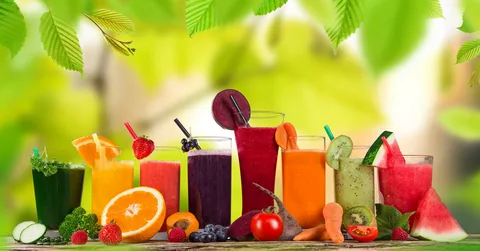Understanding Juicing
What is Juicing?
Juicing involves extracting the liquid content (juice) from fruits and vegetables while discarding the pulp and fiber. This process is typically done using a juicer or blender, resulting in a smooth and easily drinkable beverage.
Types of Juicing
Fruit Juicing
Using primarily fruits to create juices, which are often sweet and flavorful.
Vegetable Juicing
Using primarily vegetables to create juices, which may have a milder flavor and lower sugar content.
Green Juicing
Incorporating leafy greens such as kale, spinach, and celery into juices for added nutrients and health benefits.
Pros and Cons of Juicing
Pros
Nutrient Absorption
Juicing allows for the quick and efficient absorption of vitamins, minerals, and antioxidants present in fruits and vegetables.
Hydration
Juices can help keep you hydrated, especially if you struggle to drink enough water throughout the day.
Convenience
Juicing provides a convenient way to increase fruit and vegetable intake, particularly for those who find it challenging to eat whole produce.
Variety
Juicing offers endless possibilities for flavor combinations and allows you to incorporate a wide range of fruits and vegetables into your diet.
Cons
Loss of Fiber
Juicing removes the fiber content of fruits and vegetables, which is essential for digestive health, satiety, and blood sugar regulation.
High Sugar Content
Some fruit juices can be high in sugar and calories, which may contribute to weight gain and blood sugar spikes if consumed in excess.
Cost
Juicing can be expensive, especially if using organic produce or specialized ingredients.
Potential Oxidation
Juices are susceptible to oxidation, which can degrade nutrients and lead to a loss of freshness and flavor over time.
Health Benefits of Juicing
Increased Nutrient Intake
Juicing provides a concentrated source of vitamins, minerals, and antioxidants from fruits and vegetables, which can help support overall health and well-being.
Hydration Support
Drinking juices can contribute to your daily fluid intake and help prevent dehydration, especially during hot weather or periods of physical activity.
Improved Digestion
Some people find that consuming juices can help promote better digestion and relieve symptoms of bloating, gas, and constipation, particularly when incorporating ingredients with digestive properties such as ginger or mint.
Potential Drawbacks of Juicing
Lack of Fiber
Juicing removes the fiber content of fruits and vegetables, which plays a crucial role in promoting digestive health, regulating blood sugar levels, and supporting weight management.
High Sugar Content
Certain fruit juices can be high in sugar and calories, which may contribute to weight gain, insulin resistance, and other metabolic issues if consumed in excess.
Potential Nutrient Loss
Juices are susceptible to oxidation, which can lead to a loss of nutrients and decrease their overall nutritional value over time, especially if not consumed immediately after juicing.
Best Practices for Juicing
Use a Variety of Ingredients
Incorporate a diverse range of fruits and vegetables into your juices to maximize nutrient intake and flavor.
Include Leafy Greens
Add leafy greens such as kale, spinach, or Swiss chard to your juices for added vitamins, minerals, and antioxidants.
Limit Fruit Content
Be mindful of the sugar content in your juices by using predominantly vegetables with a smaller amount of fruit for sweetness.
Drink Immediately
Consume freshly made juices as soon as possible to minimize nutrient loss and oxidation.
Clean Your Juicer
Clean your juicer thoroughly after each use to prevent bacterial growth and maintain optimal hygiene.
Common FAQs About Juicing
Is juicing better than eating whole fruits and vegetables?
While juicing can provide a concentrated source of nutrients, whole fruits and vegetables contain valuable fiber that is lost during the juicing process. Consuming a balanced diet that includes both juices and whole produce is ideal for overall health.
Can juicing help with weight loss?
Juicing may aid in weight loss by providing a low-calorie, nutrient-dense option for meals and snacks. However, it’s essential to be mindful of portion sizes and overall calorie intake to avoid excessive sugar consumption.
Are there any risks associated with juicing?
Some potential risks of juicing include increased sugar consumption, nutrient loss during the juicing process, and the potential for bacterial contamination if juices are not handled and stored properly.
Can I juice vegetables instead of fruits to reduce sugar intake?
Yes, juicing primarily vegetables can help reduce sugar intake while still providing essential nutrients and hydration. Leafy greens, cucumbers, celery, and carrots are excellent options for vegetable-based juices.
Is it safe to consume raw juice during pregnancy?
Pregnant women should exercise caution when consuming raw juices, especially unpasteurized varieties, due to the risk of bacterial contamination. Consult with a healthcare professional before incorporating raw juices into your pregnancy diet.
Can juicing help detoxify the body?
While some people believe that juicing can help detoxify the body, there is limited scientific evidence to support this claim. The body’s natural detoxification processes primarily rely on the liver, kidneys, and digestive system.
Conclusion
Juicing can be a convenient way to increase fruit and vegetable intake and provide a concentrated source of essential nutrients and hydration. However, it’s essential to be mindful of the potential drawbacks, such as the loss of fiber and the high sugar content of some juices. Incorporating a balanced approach that includes both juices and whole fruits and vegetables can help you reap the benefits of juicing while maintaining overall health and well-being. As with any dietary change, consult with a healthcare professional or registered dietitian if you have specific health concerns or dietary restrictions.
- Neauvia Hydro Deluxe Skin Booster Treatments Near Hersham, Surrey - May 9, 2025
- Gaunt Face And Cheeks Treatment In Kingston Upon Thames KT1 - May 9, 2025
- Electric Play Fetish: Sparks Of Sensation And Desire - May 8, 2025

